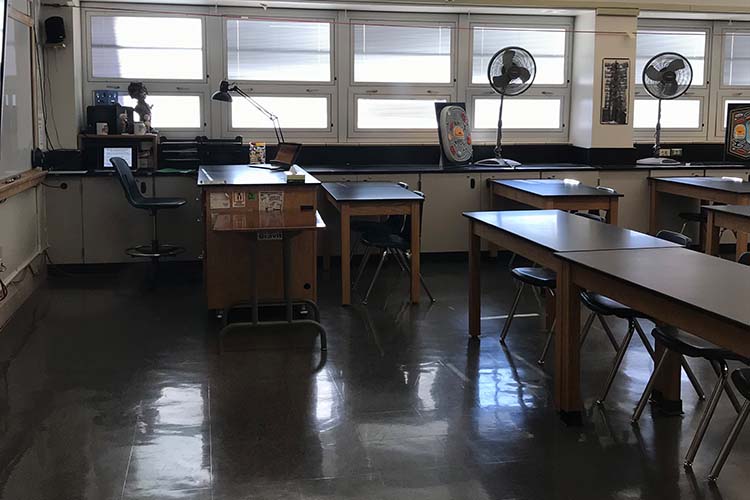
An empty classroom signifies recent absences of teachers and students. photo by Roxanne Wilkerson
Over the last couple years COVID-19 has caused a multitude of problems, and this year at Thomas Jefferson is no different.
COVID-19 has caused many changes in the world, but more specifically in education. During the year of 2020, quarantine began. Throughout the 2021-2021 school year, most students were either all remote, or attending school in a hybrid fashion near the end of the year. However, this past year there was new hope with a start to a new school year with an 100% in person return; with the addition of masks mandates. At high schools all around the country, students and staff thought that things could get back to normal. However, the virus had other plans, striking again by taking teachers, students, and other staff from school, leaving a huge deficit in staff throughout school districts everywhere.
Thomas Jefferson High School was one of the more fortunate of Denver Public Schools, as they have a greater accessibility to substitute teachers. TJ principal Mike Christoff commented, “Last week we had about 20% of the staff out, but we were fortunate to get substitute teachers to come to the school. We have a couple of substitute teachers who come everyday, and eventually they are needed somewhere.” There are plenty of other DPS schools that have had a harder time. George Washington High School had to fully shut down and go remote from Thanksgiving break to Winter break in 2021. Luckily, they were able to go back in person for the new year; however, this problem is far from over. Christoff further explained that, “The hardest part [of navigating the pandemic] is getting consistency for the students and for the staff, because we have also had 20% of our students out.” There has been a concern about the lack of community as well. Christoff adds, “It is hard to re-establish culture and it’s tricky when we can’t do assemblies and bring you guys together.” Even though there have been plenty of challenges and setbacks, online learning has introduced new things as well. With everything there is good and bad, including the pandemic. Christoff shared, “The good things that have come out of this whole pandemic have been the learning of online tools and resources that exist, like Schoology. We had no idea how any of that worked and now everybody gets it and [teachers] use it to post all their assignments. For kids, if they do need to miss, they still have access to materials.” There have been plenty of developments and emergency plans made throughout this experience, and everything that has been done has shown the determination to continue valuable education.
The pandemic has affected everyone on a great level; however, there are plenty of different perspectives with each position. Teachers have had to jump into other classes to help keep things running. An AP teacher at TJ, Garien Behling, shared that helping out in other classes has been something he did even before COVID-19. He commented, “We’re lucky we are at a school [where] we can kind of volunteer to do that. I have worked at schools where there is not enough help, so you have to do it, and I think that is becoming more of the norm right now.” That being the case, he explained that it is happening more often causing there to be less time for him to plan and grade for his class. He says, “I have to be really efficient and economical with my time in school, and think really critically about using my time well.” Having a positive attitude and being willing to share time has proved once more that there is a strong community truly dedicated to the growth of knowledge in youth at TJ. It is wonderful to see how the school works together. There is a lot of optimism throughout the halls of TJ when it comes to the dreaded question of whether we will have to return to online learning. Behling shared “it’s all up to speculation… [but] if I would have to guess, there is much more social and political capital behind the idea of a temporary and probably short return to [online] learning.” While having an optimistic attitude is helpful, there are still plenty of challenges and difficulties for the TJ community.
There is also the big question of whether students feel connected to their teachers. While teachers may feel that they haven’t been as encumbered when it comes to making sure their students are learning, Sydney Ezell, a senior at TJ shared that she feels her learning has been more compromised due to the lack of teachers in the building on a regular basis. “I think it is just harder to ask questions and get by when so many teachers are out. [It feels] like everyone is not panicking, but in a state of anxiety about it.” However, when Ezell addressed the possibility of going remote and staying remote, she agreed with the majority in hope. She says, “No, I’m optimistic, because a lot of people are vaccinated and boosted.” Even though life has changed in such a dramatic way, there is a strong community that feels confident in their ability to continue in the education and growth of students.